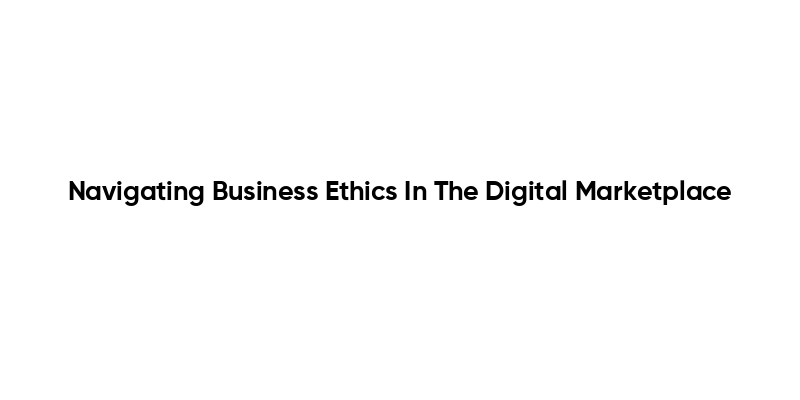In today’s rapidly evolving digital landscape, Navigating Business Ethics In The Digital Marketplace has become a critical concern for organizations of all sizes. As businesses increasingly rely on online platforms to engage with customers, the ethical implications of their practices come to the forefront. Key concepts such as data privacy, transparency, and consumer trust are essential in understanding how to operate ethically in this complex environment. This article delves into the multifaceted nature of business ethics in the digital realm, providing insights that are vital for any modern entrepreneur.
Throughout this article, readers will discover the fundamental principles that guide ethical decision-making in the digital marketplace. We will explore the challenges businesses face, such as the balance between profit and ethical responsibility, and the impact of technology on consumer rights. Additionally, we will highlight best practices that can help organizations foster a culture of integrity and accountability, ensuring they not only comply with regulations but also build lasting relationships with their customers.
As we navigate through the complexities of digital business ethics, we invite you to join us on this enlightening journey. By understanding the ethical landscape, you will be better equipped to make informed decisions that not only benefit your business but also contribute positively to society. Stay with us as we unpack these crucial topics and empower you to thrive in the digital marketplace while upholding the highest ethical standards.
In today’s rapidly evolving digital marketplace, businesses face unique ethical challenges that require careful navigation. Understanding these challenges is crucial for maintaining trust and integrity in online transactions.
Data Privacy and Protection
Data privacy has become a paramount concern in the digital marketplace. With the increasing amount of personal information collected by businesses, consumers are more aware of their rights regarding data protection. Companies must comply with regulations such as the General Data Protection Regulation (GDPR) and the California Consumer Privacy Act (CCPA) to ensure that customer data is handled responsibly.
Failure to protect consumer data can lead to severe consequences, including legal penalties and loss of customer trust. Businesses should implement robust data security measures and transparent privacy policies to foster a sense of security among their users. By prioritizing data privacy, companies can build long-lasting relationships with their customers.
Transparency in Advertising
Transparency in advertising is essential for ethical business practices in the digital marketplace. Consumers are increasingly skeptical of online advertisements, often questioning their authenticity. Businesses must ensure that their marketing strategies are honest and do not mislead consumers.
Clear communication about product features, pricing, and potential risks is vital. Companies should also disclose any sponsored content or partnerships to maintain transparency. By adopting ethical advertising practices, businesses can enhance their credibility and foster consumer loyalty.
Intellectual Property Rights
Intellectual property (IP) rights are a critical aspect of business ethics in the digital realm. With the ease of sharing and distributing content online, protecting intellectual property has become more challenging. Businesses must respect the IP rights of others while also safeguarding their own creations.
Failure to adhere to IP laws can result in legal disputes and damage to a company’s reputation. Organizations should educate their employees about copyright, trademarks, and patents to ensure compliance. By respecting intellectual property, businesses can contribute to a fair and innovative digital marketplace.
Ethical Use of Artificial Intelligence
The rise of artificial intelligence (AI) in the digital marketplace presents both opportunities and ethical dilemmas. While AI can enhance customer experiences and streamline operations, it also raises concerns about bias, discrimination, and job displacement. Businesses must navigate these ethical challenges carefully to ensure responsible AI usage.
Implementing ethical guidelines for AI development and deployment is crucial. Companies should prioritize fairness, accountability, and transparency in their AI systems. By addressing these ethical considerations, businesses can harness the benefits of AI while minimizing potential harm.
Consumer Rights and Fair Practices
Consumer rights are at the forefront of ethical considerations in the digital marketplace. Businesses must ensure that their practices align with consumer protection laws and promote fair treatment. This includes providing accurate information, honoring return policies, and addressing customer complaints promptly.
By prioritizing consumer rights, businesses can foster trust and loyalty among their customers. Implementing fair practices not only enhances a company’s reputation but also contributes to a more equitable digital marketplace.
Sustainability and Corporate Social Responsibility
Sustainability and corporate social responsibility (CSR) are increasingly important in the digital marketplace. Consumers are more likely to support businesses that demonstrate a commitment to ethical practices and environmental stewardship. Companies should integrate sustainability into their business models and communicate their efforts to consumers.
By adopting sustainable practices, businesses can reduce their environmental impact and appeal to socially conscious consumers. Transparency in CSR initiatives can further enhance a company’s reputation and foster a positive brand image.
| Aspect | Description |
|---|---|
| Definition of Business Ethics | Business ethics refers to the principles and standards that guide behavior in the world of business, particularly in the digital marketplace. |
| Importance of Ethics | Ethical practices build trust with consumers, enhance brand reputation, and ensure compliance with laws and regulations. |
| Challenges in the Digital Marketplace | Issues such as data privacy, cybersecurity, and misinformation pose significant ethical challenges for businesses operating online. |
| Data Privacy | Companies must handle consumer data responsibly, ensuring transparency and obtaining consent for data collection and usage. |
| Cybersecurity | Businesses are responsible for protecting sensitive information from breaches and cyberattacks, which requires robust security measures. |
| Misinformation | Ethical marketing practices involve providing accurate information and avoiding deceptive advertising that can mislead consumers. |
| Corporate Social Responsibility (CSR) | Companies are encouraged to engage in CSR initiatives that contribute positively to society and the environment, enhancing their ethical standing. |
| Regulatory Compliance | Adhering to laws and regulations, such as GDPR and CCPA, is crucial for ethical business operations in the digital space. |
| Building an Ethical Culture | Organizations should foster an ethical culture by training employees, establishing clear policies, and encouraging open communication. |
| Conclusion | Navigating business ethics in the digital marketplace is essential for sustainable success, requiring a commitment to ethical practices and continuous improvement. |
This HTML document provides a structured overview of the topic “Navigating Business Ethics In The Digital Marketplace” in a tabular format, summarizing key aspects and their descriptions.



